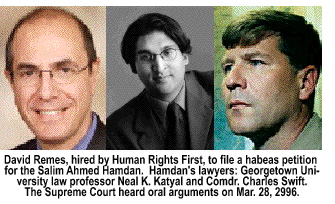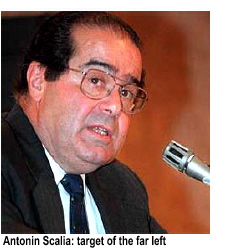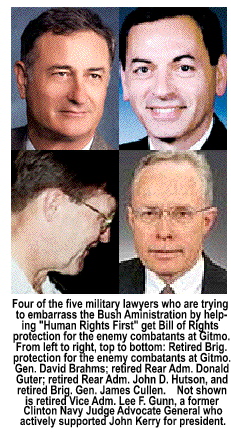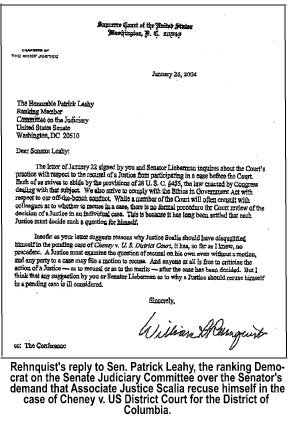
News
Behind the Headlines
Two-Cents Worth
Video of the Week
News Blurbs
Articles
Testimony
Bible Questions
Internet
Articles (2012)
Internet Articles (2011)
Internet Articles (2010)
Internet Articles
(2009)
Internet Articles (2008)
Internet Articles (2007)
Internet Articles (2006)
Internet Articles (2005)
Internet Articles (2004)
Internet Articles (2003)
Internet Articles (2002)
Internet Articles (2001)

Liberals try
to force Scalia to recuse
himself from hearing key detainee case.
Roberts already recused. Expect default to the left.
With five of the nine members of the United States Supreme Court now conditioned to incorporate international legal decisions into American case law for the International Judiciary Academy (with the help of the International Law Institute) that is trying hard to merge the US federal judiciary into their utopian version of a one-world court system, it appears the timing couldn't be worse for Defense Secretary Donald Rumsfeld—or for the American people. Oral arguments were heard by the US Supreme Court on Wed., March 29 on the rights of detainees being held in the brig at the US Naval Station at Guantanamo Bay, Cuba filed by attorneys for Osama bin Laden's former driver, Salim Ahmed Hamdan. Hamdan is charged with conspiracy. His lawyers—Cmdr. Charles Swift, USN and Georgetown University law professor Neal K. Katyal—are arguing that since conspiracy is not recognized as a war crime, Hamdan cannot be held without a hearing.

On the eve of
the hearing the attorney for five retired senior level military officers
filed an amicus brief on behalf of the detainees. The attorney, David
Remes, also delivered a letter to the Supreme Court late in the day
on Monday, March 27 demanding that Associate Justice Antonin Scalia
recuse himself from hearing oral arguments or voting on the question of
whether or not the detainees—all of whom have al Qaeda or
Taliban ties—are entitled to have their cases heard by a US District
Court Judge—who, constitutionally, never hears military cases since
they are always heard by a military tribunal.  In
November, 2004, the US Supreme Court ruled that the federal courts of
the United States have the authority to preside over challenges brought
by some of the 4500 foreign nationals being held at Guantanamo Bay.
In
November, 2004, the US Supreme Court ruled that the federal courts of
the United States have the authority to preside over challenges brought
by some of the 4500 foreign nationals being held at Guantanamo Bay.
On March 8, Scalia delivered an address to an audience at the University of Freiburg in Switzerland in which Scalia said it was crazy to suggest that enemy combatants captured fighting the United States should have access to American courts where they could receive a jury trial. Scalia also dismissed the notion that detainees at Guantanamo Bay should have the right to trial. In his letter asking for Scalia's recusal, Remes suggested that Scalia's remarks "...give rise to the unfortunate appearance that, even before the [oral hearing] was complete, he had already made up his mind about issues in the case." Scalia also made an offhand comment that the issue was personal with him because his son was fighting in Afghanistan, and those who were shooting at Americans were shooting at his son. Remes added that the final comment created the appearance of personal bias because of his son's military service in a war zone.
Chief Justice John Roberts recused himself from voting on the detainee question. Roberts sat on the US Circuit Court of Appeals for the District of Columbia 3 judge panel that rejected Hamdan's appeal in July, 2005. Roberts' view was that the military tribunals were legal and they had jurisdiction over the detainees.
If Scalia recuses himself from voting on the habeas issue, there will only be two rule-of-law justices voting to uphold the position argued by Solicitor General Paul D. Clement—that enemy combatants should not have "American citizen" access to the federal courts. But, five jurists who believe international law should be incorporated into our legal system believe Hamdan's argument has legal standing, creating what will be a 5-to-2 decision. If Scalia votes, it will be a 5 to 3 decision. If Roberts weighs in and votes, there will be a 5-4 decision—but which way? Only one of the liberals—Associate Justice Stephen Breyer seemed inclined to lean towards the status quo. Breyer pleaded with Clement to find some middle ground that would allow the high court to sidestep the question of whether Congress can deprive the court of jurisdiction in habeas corpus cases that involve non-citizens outside the boundaries of the United States. If Roberts does not vote, there will be a 5-2 or 5-3 decision against the Bush Administration—and against the American people.
Even before the first oral salvos were fired by any of the attorney's—and before the Roberts' recusal—it was obvious that, between the liberals and conservatives, it would be a four-four tie with Associate Justice Anthony Kennedy functioning as the tiebreaker. Which, of course, would make Kennedy's comments during the March 28 hearing most telling. Kennedy commented to Clement that he believed the Supreme Court had jurisdiction over the enemy combatants at Gitmo. Kennedy even suggested that, in his view, the high court should abstain from ruling on the validity of the military commission until after Hamdan's trial on the conspiracy charges.
(The liberal
doesn't see a conflict in the fact that four or five of the justices entered
the March 28 hearing with their minds already made up. And that was okay.
But it wasn't okay for Justice Scalia to hold the view that the
commission was valid and that the courts did not have jurisdiction since
the high court ruled a year earlier that they did.  One
of the liberal legal pundits on Fox News commented that it wasn't
fair that Hamdan's lawyers would have to argue "uphill"
to convince Scalia. Judges, he said, are supposed to have no opinion
on the issues until they hear the arguments of the case. Because we are
human, there isn't a judge in the world who can hear a case without their
own biases coloring their judgment at least a little. Judges, like the
rest of us, have predisposed ideological views. The personal views of
any judge will always poison the well a little—even if they use time-tested
legal precedents as a basis for their rulings since they will always search
for the precedent's that best match their personal views.
One
of the liberal legal pundits on Fox News commented that it wasn't
fair that Hamdan's lawyers would have to argue "uphill"
to convince Scalia. Judges, he said, are supposed to have no opinion
on the issues until they hear the arguments of the case. Because we are
human, there isn't a judge in the world who can hear a case without their
own biases coloring their judgment at least a little. Judges, like the
rest of us, have predisposed ideological views. The personal views of
any judge will always poison the well a little—even if they use time-tested
legal precedents as a basis for their rulings since they will always search
for the precedent's that best match their personal views.
Kennedy told Clement that he found the Solicitor General's argument troubling since Hamdan's lawyers argued that because the military commission lacked UN Geneva Convention standing, it was invalid. Kennedy shot down the Bush Administration's legal argument in one fell swoop. "The historic office of habeas corpus is to test whether or not you're being tried by a lawful tribunal," Kennedy said. Hamdan's lawyers—Swift and Katyal—argued that because the military commission lacked the standing outlined by the Geneva Convention, it was not valid. "The historic office of habeas corpus," Kennedy noted, "is to test whether or not you're being tried by a lawful tribunal. And [Hamdan] says, under the Geneva Convention, as you know, it hasn't."
At that point,
Scalia jumped in to assist the Solicitor General. "In the
normal criminal suit," he said, "even if you claim that
forum isn't properly constituted, that claim is not adjudicated immediately.
We don't intervene on habeas corpus when somebody says that the panel
is improperly constituted.  We
wait until the proceedings terminated, normally."
We
wait until the proceedings terminated, normally."
Kennedy interrupted, objecting to Scalia's assessment. "Is that true?" he asked. "If a group of people decide they're going to try somebody, we wait until that group of people finish the trial before the court intervenes to determine the authority of the tribunal?" In addition to Scalia, newly-confirmed Associate Justice Samuel Alito invoked the comment that he, likewise, supports the argument that the Hamdan trial by military tribunal should proceed. He added that it seemed unusal to him for the US Supreme Court to be listening to arguments for an appeal to conspiracy to commit war crimes before the case was heard by the military tribunal. Alito felt the hearing was akin to putting the cart before the horse. In the initial filing by Hamdan's lawyers, Swift and Katyal, the US District Court in Washington, DC ruled in favor of Hamdan, forcing the Defense Department to suspend the tribunals until the Supreme Court heard the argument.
Without the vote of Roberts and Scalia, the Bush Administration loses in a lopsided 5 to 2 vote that will give Bill of Rights protection to non-citizen enemy combatants. And it will require the Bush Administration to surrender Hamdan and nine other Gitmo detainees to the jurisdiction of the federal court for a traditional trial on conspiracy charges.
The question that has loomed large with the mainstream media concerned the "right" of Scalia to cast his vote after his personal views were so eloquently expounded on March 8. Yet, the personal views of each of the Justices is so transparent that the collage at the top of the page—how each of the Justices would likely vote—was constructed on Monday, March 27—a day before the oral arguments at the Supreme Court. Fox News Senior Judicial Analyst Judge Andrew Napolitano argued on Monday that, while he did not think he would, Scalia should recuse himself because his vote was pretty much cast in stone on March 8 before the habeas petition was filed with the high court.
Yet, the Supreme Court has a history of biased decisions going back to the 1935 New Deal court. FDR politicized the Supreme Court in 1935 to protect the New Deal from being systematically dismantled since most of the laws violated the Bill of Rights or the separation of powers. Roosevelt had to stack the court with New Dealers or risk losing the bureaucracy he was unconstitutionally creating inside-the-beltway.
That's why confirmation hearings for federal judges are the most acrimonious of all confirmation hearings. Since federal magistrates are appointed for life, Congress and the White House fight to appoint judges whose personal ideology dovetails most closely with their own. By doing so, presidents can promulgate their party's political ideology for two, three, or more decades. But most of all, they appoint likeminded judges to help safeguard the political and economic agendas they have chosen to shape the nation—particularly if their agenda trespasses on the Bill of Rights.
When FDR appointed men to fill vacancies on the US Supreme Court or for any of the lesser judgeships on the federal bench, all of them were all made with one core objective in mind—finding men who would agree to protect the New Deal even though most of the New Deal laws violated the Constitution.
FDR appointed nothing but cronies, minions and party hacks. If Roosevelt had not had a strong liberal majority in the House and Senate from 1937 to 1943, he would never have gotten New Dealers Hugo Black, Stanley Reed, Felix Frankfurter, Frank Murphy, James Byrnes or William O. Douglas through the vetting process. Black and Frankfurter (who was one of the socialist founders of the American Civil Liberties Union) engineered most of the New Deal. Frankfurter wrote most of the laws and Black pushed them through the Senate. To anyone who checked the pedigrees of Roosevelt's federal judicial nominees, those placed on the high court were appointed solely to protect the New Deal laws at all costs. Not one time did any of FDR's New Deal high court appointees ever abstain from voting on one of the laws they wrote, pushed through Congress or, in the case of Stanley Reed of Frank Murphy, defended in federal court. Nor has any liberal justice at any time since 1935, recused themselves from voting on cases for which they had prior involvement.
Yet, Remes
believes there is ample precedent to force Scalia to recuse himself
because of his personal views. Remes was hired by Human Rights
First to end Bush's military tribunals. The amicus brief prepared
by Remes argued the habeas rights of the detainees, maintaining
that men who are classified as enemy combatants are entitled to due process
in American courts because they are not uniformed soldiers.  (If
the enemy combatants are tried by military tribunals, they will be treated
as terrorists and not as civilian patriots defending their land, their
religion or their national heritage from the warmongering Americans who
are trying to convert them to Christianity.)
(If
the enemy combatants are tried by military tribunals, they will be treated
as terrorists and not as civilian patriots defending their land, their
religion or their national heritage from the warmongering Americans who
are trying to convert them to Christianity.)
The five retired officers who joined the far left Human Rights First advocacy group and the American Civil Liberties Union to fight for the rights of the detainees who, before they were captured, were killing Americans in Afghanistan and Iraq are: Marine Corp Brig. Gen David M. Brahms, Army Brig. Gen. James P. Cullen, and US Navy admirals Lee F. Gunn, John D. Hutson and Donald J. Guter. These officers are part of a group of politically-active liberal retired senior military people who support liberal presidents and liberal politics. Their advocacy is promoted by several antiwar and hate websites—including al Jazeera.
Liberal groups are targeting Scalia in order to nullify his vote on the high court. By doing so they hope to create a defacto eight-member court. on issues where Justice Sandra Day O'Connor could be counted on to vote with the left. In the mind of the far left, not losing is a close second when winning is not an option. The Boston Herald reported on Mon., March 27, 2006 that Scalia gave one of their reporters the "finger" when the reporter asked him a question as the jurist left Mass at Cathedral of the Holy Cross Church on Sunday. This somehow, in the mind of the Herald editors, raises questions about Scalia's impartiality on religious rights issues. The Herald suggested that Scalia should recuse himself from hearing any church and state cases.
Scalia wrote a blistering letter to the Herald, criticizing the reporter whom, he said, insulted him. The gesture, where one finger is moved slowly back and forth under the chin, Scalia said, simply means, "I couldn't care less," or, "it's no business of mine." When he answered the rude reporter who invaded his Sabbath with the gesture, the reporter defensively shot back: "That's Sicilian!" According to the letter Scalia wrote to the paper, "From watching too many episodes of the Sopranos, your staff seems to [believe' that any Sicilian gesture is obscene—especially when made by an Italian jurist." Then, he said, "I am, by the way, an American jurist."
 Scalia
has become the target because the liberals believe because of his outspoken
nature, he will the easiest to to push into recusing himself from cases
to avoid an appearance of impropriety. Since 2003 liberals have tried
to force him to recuse himself from rendering judgment on two other cases.
In 2004 he did recuse himself from voting on the whether the term "Under
God" in the Pledge of Allegiance violated the separation of
church and State. That case was Elk Grove Unified Sc hool District
v. Newdow. In that case, the high court ruled that Newdow had no standing
as a plaintiff to file such an action. In 2003, the Sierra Club
tried to force him to recuse himself from Cheney v US District Court
for the District of Columbia. In that suit, the Sierra Club
and other environmentalist groups were trying to force Cheney into
revealing the names of his energy advisers. The Sierra Club demanded
that Scalia recuse himself from that case after it was learned
the jurist had gone duck hunting with the Vice President. Scalia
refused to recuse himself. In response, liberals in both the House and
Senate headerd by Congressman John Conyer [D-MI]. Conyer enlisted
the support of Sen. Patrick Leahy, the ranking Democrat on the
Senate Judiciary Committee, who wrote to then Chief Justice William
Rehnquist demanding that Scalia be forced to recuse himself
from hearing Cheney v US District Court for the District of Columbia.
Rehnquist refused.
Scalia
has become the target because the liberals believe because of his outspoken
nature, he will the easiest to to push into recusing himself from cases
to avoid an appearance of impropriety. Since 2003 liberals have tried
to force him to recuse himself from rendering judgment on two other cases.
In 2004 he did recuse himself from voting on the whether the term "Under
God" in the Pledge of Allegiance violated the separation of
church and State. That case was Elk Grove Unified Sc hool District
v. Newdow. In that case, the high court ruled that Newdow had no standing
as a plaintiff to file such an action. In 2003, the Sierra Club
tried to force him to recuse himself from Cheney v US District Court
for the District of Columbia. In that suit, the Sierra Club
and other environmentalist groups were trying to force Cheney into
revealing the names of his energy advisers. The Sierra Club demanded
that Scalia recuse himself from that case after it was learned
the jurist had gone duck hunting with the Vice President. Scalia
refused to recuse himself. In response, liberals in both the House and
Senate headerd by Congressman John Conyer [D-MI]. Conyer enlisted
the support of Sen. Patrick Leahy, the ranking Democrat on the
Senate Judiciary Committee, who wrote to then Chief Justice William
Rehnquist demanding that Scalia be forced to recuse himself
from hearing Cheney v US District Court for the District of Columbia.
Rehnquist refused.
While media reports suggest that recusals are commonplace on the Supreme Court—particularly when the cases deal with companies held within the blind trusts of the jurists—they are not. Looking at the Rehnquist Court, the collective justices have a lifetime recusal rate of 2,816. Former Justice Sandra Day O'Connor had the highest rate of recusals during her tenure on the judiciary—675 abstentions. But she never recused herself once she joined the Supreme Court. Nor has any liberal on the court. During the past 12 years, there have been only 2 recusals by Supreme Court justices. Associate Justice Clarence Thomas recused himself from voting on the Virginia Military Institute case because his son was a student there. And Justice Scalia recused himself from the Elk Grove Unified School District case because he made a speech in which he questioned the mind of the 9th Circuit Court of Appeals when it ruled that the words "Under God" in the Pledge of Allegiance violated the "church and state" principle.
But you have to hand it to the liberals. When you lose your grip on the high court, do the next best thing. Force your opponents to recuse themselves from rendering decisions anytime they have a "known view" on the cases that are coming before the Supreme Court. That way, the minority will always be able to write the majority opinion.
Well—once again—for whatever its worth, you have my two cents worth.



Copyright © 2009 Jon Christian Ryter.
All rights reserved.


